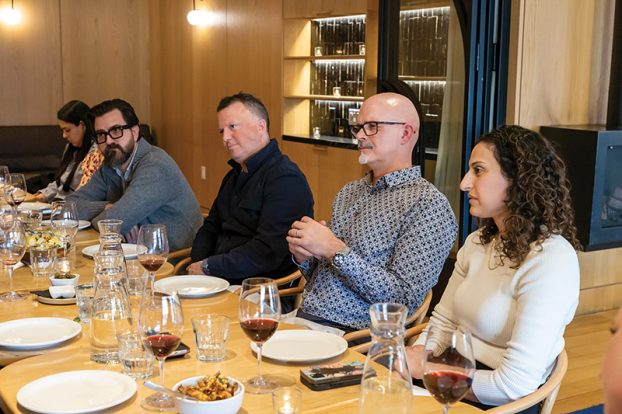While it is a near-realized goal of Cossette Communication Group to become a global player, the recent launch of its new subsidiary, Ricochet Branded Content, is not as much of an international play as it is a response to the changing needs of advertisers and consumers alike.
‘We’re doing this because it makes sense in Canada,’ says Dominic Caruso, president of Cossette Toronto and member of the Ricochet executive committee.
But the question remains: Is the Canadian marketplace ready for an infusion of branded content? Or, will Ricochet, like its brethren Chokolat, be forced to draw most of its business from the U.S., where branded content is quickly gaining in acceptance?
With the exception of a couple gems like Ma Maison Rona in Quebec (TVA) and its English carnation My Rona House (Global TV), a home-renovation series that showcases the Rona brand experience, branded content on the television dial has seen little to no success in Canada.
Admittedly, says Ricochet’s Toronto-based managing partner, development Yves Desjardins-Siciliano, ‘the biggest challenge in the short term is educating clients and developing the business models.’
Just as it was in the early days of interactive marketing, ‘branded content is in its infancy in Canada, so there’s a lot of pioneering work that needs to be done here,’ adds Caruso.
The diversification of existing communication channels and the emergence of new outlets like the Web have led to major media fragmentation. That, coupled with the increasing cost of production and the development of TV spot-threatening technology, have paved the way for branded content in the U.S. and U.K. over the past two years. An educated and desensitized consumer set has also raised the bar on what advertisers must provide to capture eyeballs.
With similar forces at play in Canada, the trend is likely to emerge domestically sooner than later.
Which is precisely what Desjardins-Siciliano and managing partner, creative Jacques Labelle, are banking on.
Ricochet crosses all media
Unlike Taxi’s entertainment offshoot Chokolat, which produces both branded and unbranded television programming, Ricochet’s mandate is to develop branded content across all media, including television, radio, magazine, books, music, video games and live events.
And unlike traditional production houses that develop the content then look to advertisers as a source of revenue, ‘we start with the advertisers’ objectives, then we develop the platform based on what they want to communicate about their brand. That’s what sets us apart,’ says Labelle, the former VP/CD at Cossette.
Ricochet, which officially launched June 1 and will initially operate out of Cossette’s Toronto, Montreal and New York offices, will go after new clients as well as tapping into Cossette’s local and international client base – rounding out the agency’s convergent strategy.
‘This is about promoting a brand and connecting to the consumer in an informative and entertaining way. Our call to action is, ‘get to know me and you’ll love me,’ not ‘go buy a product tomorrow,” says Desjardins-Siciliano, who until joining Ricochet spent the last 20 years on the client side, spearheading development and growth strategies for such brands as Bell Mobility, IBM and most recently Aeroplan.
A recent program Ricochet helped develop with Production Tele-vision and creator Marie Vien for The Lighthouse, Children and Families charity in Quebec is a good example of the branded content company’s positioning. Broadcast on TQS this past Mother’s Day, the one-off featured appearances and performances by well-known Quebec artists paying homage to family care and giving valuable exposure to the charity’s efforts to build facilities for kids with terminal illnesses. ‘There was nothing sold or attempted to be sold. We just promoted the idea behind Lighthouse, helping to legitimize the organization so when it goes out to raise funds, people are aware of the cause,’ says Desjardins-Siciliano.
While the partners remain tight-lipped on the projects they’re currently working on, they both cite the mood music CDs sold at Starbucks and Pottery Barn as some of the more interesting branded content done outside the TV realm in Canada, albeit through American subsidiaries. ‘They allow you to take home the atmosphere these brands are trying to convey,’ says Labelle.
Likewise, Starbucks in the U.S. offers wireless capabilities in its stores, so the customer can watch custom-made music videos, which could provide, for example, an exclusive extract of an artist who’s coming to town.
These kinds of ‘lifestyle-oriented’ initiatives have a lot of potential with Canadian retailers, says Desjardins-Siciliano.
The television challenge
On the TV side, however, the business model is wrought with challenges in Canada, where production costs and scale remain ongoing issues.
‘Smaller deals are happening here,’ says Jeff Spriet, president of Chokolat, which launched last spring. ‘But with only one-tenth of the population [of that in the U.S.], it’s tough to amortize production costs associated with the quality productions you see in prime time.’
It is also a difficult proposition for network programmers to co-opt their American drama for such commercial endeavors as branded content, says Mark Sherman, CEO of Montreal-based Media Experts.
Despite economic challenges, broadcasters still respect the line between church and state. And without a broadcast partner, the client would have to pay for the production, the airtime and the promotional time to drive people to the show – a prohibitive expense at best.
‘The biggest thing that bodes well for Ricochet is its position in the Quebec market, where something like the top 20 shows are produced locally and where they have their own star system,’ says Spriet. ‘In some ways,’ he adds, ‘the Quebec market is even more ripe for branded content than the U.S. and the U.K. because the community is so insular. Broadcasters are rubbing shoulders with the big brands all the time, which really helps.’
But while that may be true in the entertainment sphere and even with product placement initiatives, it stands to reason that TVA and SRC would be just as reticent to compromise their programming objectives as Global or CTV, says Sherman, who applauds advertisers seeking creative and strategic alternatives to the 30-second spot.
In the same vein, Spriet says he’s excited about the launch of Ricochet because ‘it helps legitimize this discipline of marketing.’
Meantime, neither company is looking to replace high-rating series on prime time with branded content – particularly at this early stage of the game.
But Caruso says there is opportunity for one-off branded programming that can run in primetime. And the specialty channels, which may not have the audience numbers as conventional prime time, offer a richer and more targeted environment, he adds.
‘There’s more of a significant opportunity aligning your brand to the people who are most interested in it on these [specialty] channels.’
Ricochet on the go
In late May, Ricochet, in partnership with the TVA Group filed a proposal to the Quebec Liquor Board to develop two magazines, which is a good example of how ‘we look after our customers strategically and associate ourselves with premium content providers at a low cost,’ says Labelle. A contract will be awarded in August.
Meanwhile, as part of the Quebec Department of Health and Social Services contract that was awarded to Cossette Quebec in April, Ricochet has been retained to produce TV and magazine branded content that will be deployed next year.
The company also reports that it is working on two undisclosed television programs, a musical CD for a retailer, and a variety of publications.























